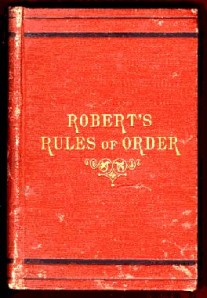Brigadier General Henry Martyn Robert published a book in 1876. That book would later go on to become the standard rule book for procedure in organized assemblies in the United States and beyond. That book is called Robert’s Rules of Order.
Christians like things like order because we believe we have been fashioned by and after a Creator who desires order. The Creator God established the foundations of the heavens and the earth and all that lives in the air, on the land, and in the waters in a specific order.
 God ordered creation to climax with the creation of those bearing the image of God, man and woman. God orders the history of Israel it could be argued to follow a cycle of relational covenant established, covenant broken, punishment/oppression, crying out for God, covenant renewed, and the cycle continues.
God ordered creation to climax with the creation of those bearing the image of God, man and woman. God orders the history of Israel it could be argued to follow a cycle of relational covenant established, covenant broken, punishment/oppression, crying out for God, covenant renewed, and the cycle continues.
It is a cycle perhaps most apparent in the book of Judges, however, I believe it is apparent entire Old Testament and perhaps even in the New Testament though much of the New Testament isn’t as much a history of a people in the same way that the Old Testament is, but more a bearing witness to Jesus, the Kingdom of God, and how this promised New Covenant community advances and adheres to the Gospel of Jesus Christ. However, in the personal relationships that people have with God through Jesus the Son of God and second person of the Holy Trinity, there is often a similar cycle, isn’t there? At one point, a person enters into relationship with God after confessing sins and repenting.
Then, there is a joy and celebratory mood which follows and lasts… for a time. Then, there is a slip here or there, and the individual finds that they have not been made perfect the instant they entered into that relationship with God and perhaps there could be a minor rebellion at one point even in their relationship even if on a small scale. Then, if their relationship was true, they cry out for forgiveness while confessing to God and perhaps to another if it is necessary and perhaps after some consequence to their action/s, they enter back in.
Though, as a Christian it is not that one has left the covenant relationship entirely, but simply given in to the desires of the flesh or sinful nature of the old life as opposed to the new life in the Spirit. Needless to say there is an order and a cycle in it. In fact, as Protestant Christians we even refer to salvation itself as an order in the classic formula of the ordo salutis, order of salvation.
Now, I think we can all agree that not only do a lot of people like order, but most Christians desire order too. However, what if the desire for order in everyday life became idolatrous, what would that look like?
Often times, Christians will formulate their theology as they grow in Christ and learn from God’s Word and other Christians who are like-minded, however, there has to be an order even in their theology. This order can easily be disrupted by others who hold to a different order of theology as Christians. Perhaps it is simply a matter of one Christian saying we should baptize infants and another saying we should baptize those who believe the faith. Both claim passages in the Bible for their evidence and support, however, a small wrench has just been tossed into their system of theology and how they apply the Bible to their lives.
The two then continue to debate the issue with one claiming the other is unbiblical and the other saying the same in the other direction. When the theological dust settles over the debate, the two part ways and decide it is better that they don’t talk to one another as much because they are simply too different and they decide to join different churches where the theologies of the churches they join are on par with their theological system.
What has just happened here is not all that different from what has happened in the forming of many Protestant denominations. One Christian or a group decide a particular point of Christian theology is more important than another, and a new Protestant denomination forms. Now, the point of this post is not to bash denominations of Protestant Christianity.
They serve a purpose and there is a lot of good in many of them even though I believe they do divide the Body of Christ to an extent, and this a division that won’t be reconciled until the new heavens and new earth of Revelation come to pass. That’s besides the point.
My point is that many Christians simply do not know how to get along with one another. How do you treat someone with different views than you whether Christian or of some other faith or agnostic or atheist, etc.?
In history, there have been some radically extreme reactions to people who hold different views than Christians on issues and I am rather thankful that most Christians have come a long way from that place, and are treating others much better. Though, I will not leave out that some Christians have beaten others, imprisoned others, exiled others, humiliated others, and even killed others simply because they had different views than themselves whether Christian views or some other views.
I think it is important, then, to speak of Christian civility. There has been a great rise of Christian hate over the years against other Christians and other people in the world. Now, this is not saying I want people to be tolerant of everything. No, you are missing the point if you are reading that into this. I am saying that when I read the Bible about a God of love (1 John) who commands people to obey the commandments of the Old Testament which Jesus summarized in ‘love God and love others,’ then I see Christians shouting at funerals, standing on the street with signs that say ‘God Hates Fags,’ being associated more with an American political party than Jesus, and writing all kinds of cruel things about any given author in existence on Facebook; I feel there might just be a problem.
This is not only something that exists on the streets, but this exists in the Christian academy. This exists in seminary. Some seminaries have been running various professors out of their seminaries because they all of a sudden have become heretical despite many of these same professors holding to the theological views of these institutions. In the academy it has been Bruce Waltke, Peter Enns, Scott Hafemann, and others who have been victim of this lack of Christian civility today. Though, it is perhaps most apparent in literature, especially Christian literature. Dan Brown’s ‘Da Vinci Code’ became popular because so many Christians were against it. Journalists and writers today have made note of how books like Brown’s associated with Christianity say something remotely controversial sell like $1 Margaritas on Cinco de Mayo. The book The Shack received similar popularity in large part because many found the theology skewed and felt a need to tell everyone they know about it to the point that nearly everyone was reading it. With things like this, perhaps it would be better to simply say nothing about these things for the sake of not supporting them or saying something about them only when an opportunity to share the Gospel is revealed.
This lack of Christian civility has been exacerbated by the existence of such social platforms as Facebook, Twitter, and MySpace. Recently, famous preacher/author Rob Bell wrote a book called ‘Love Wins’ which has stirred the Christian theological tension soup once again to a near boil. Bell asks an intriguing question which many might ask and that is, ‘If God is good and if God is a God of grace and love, would he really send people to burn in fire and brimstone for all eternity and only send a handful he chooses to heaven?’ The controversy is over not only his honesty to ask such a bold and challenging question, but also over where many feel he answers that question which they believe to be universalism. During the Protestant Reformation, John Calvin affirmed perhaps as Paul affirmed the stoning of Stephen, the burning at the stake of Michael Servetus. Servetus was declared a heretic by Protestants and Catholics of the day because he held to a non-Trinitarian theology and promoted it. Both Calvin and Paul are some of the more respected Christian theologian-preachers in history, but had a personal experience of disagreeing with others to the point that the only way to make things right was for the other person to die. Now, it could be argued that Paul wasn’t a Christian at the time and was persecuting a Christian while Calvin was a Christian persecuting a non-Christian. The point here is that Paul was grieved by the persecution of God’s church and was told he would suffer greatly for what he’d done throughout his life which he clearly did (Read Acts). Calvin I am less familiar with, but I would like to think by reading Calvin’s writings that he would rather be known for preaching the Gospel of Jesus and seeking to imitate God in his life as opposed to having killed a man. Yes, Calvin had a responsibility over a flock as a pastor, but was he really the shepherd or is Christ the shepherd? Were those really his sheep or are they God’s sheep? This is not to shirk responsibility, but a matter of seeing oneself as a pastor under the leadership of our Lord Jesus and not seeing ourselves higher than we are.
Christians, thankfully, are not burning Rob Bell at the stake unless you count the content spoken on Twitter and Facebook as reality. That is the thing. It is not reality, it is merely the internet and an anonymous means of voicing an opinion on any given issue to the public. So, in one sense you can have this alternate reality on the internet, but in another sense you can have a completely normal or different life in the real world apart from the internet. The issue for us as Christians is that someone important, i.e. Jesus, said that doing something bad is not only a sin, but even thinking something bad about someone else is a sin. I’m grossly paraphrasing here, I know, but we are called as Christians to live godly lives and to be holy because God is holy. What does that look like? JESUS is what it looks like. We are called to imitate Jesus in our lives. How did he respond to those he didn’t see eye to eye with or thought were not theologically on the same playing field?
Jesus responded with instruction, correction, provocative question, and occasionally a verbal face to face rebuke for the sake of bringing the one rebuked to a place of correction or edification. Jesus rebuked out of love and though he was angered at the scribes and Pharisees for perverting the Law to being about their own security and pride as opposed to being about God while revealing our sin, he sought out those he disagreed with if they weren’t following him around already and ate with them while discussing what he was about and showing them by example how to treat others.
It is a sickening thing to think that Christians in America today are more often known for what they disagree with and don’t like than what they believe in and how they live out their faith in love for God and others.
It is my prayer that Christians in this country and in the world and myself, would seek out God and desire to love more while praying for those we disagree with and speak the Truth in love. I pray that God gives us all a spirit of boldness to share the Gospel and to live by faith even when it is difficult, but also that we don’t do this at the expense of love for God and others in an effort to establish our order in the world as opposed to God’s order in his New Creation, New Kingdom, and by his Spirit. May we seek to love more and aspire each to a measure of Christian civility that we might decrease and that He might increase in our hearts, in the hearts of others, and in all the world that He might be glorified. Amen
Matt Gladd isthe pastor of First Baptist Church of Kittery Point, Maine.He is a graduate of Gordon-Conwell Theological Seminary in South Hamilton, MA, about 30 minutes northeast of Boston. He was born in the Adirondacks of northern New York, but grew up in Kansas. MORE




